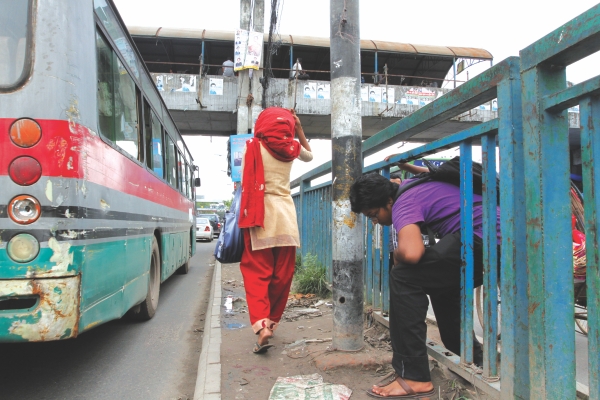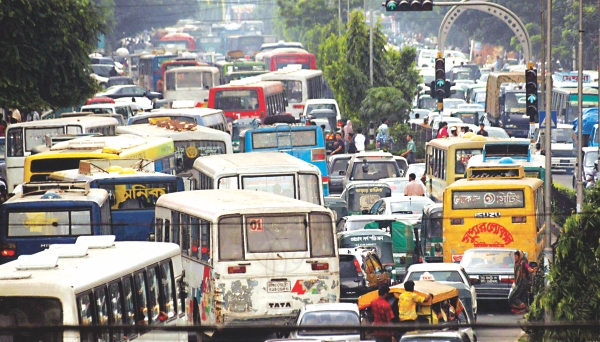| Home - Back Issues - The Team - Contact Us |
 |
| Volume 11 |Issue 36| September 14, 2012 | |
|
|
Impressions
The Fatal Love for Short-cuts Shah Husain Imam Short-circuiting is the way of life in Dhaka city, by extension in national life. Oxymoronic, yes, when you consider wasting three to four hours on the roads everyday of your single-life quota. In fact, taking short-cuts to fulfilling personal agenda is being a lifestyle choice for many in the country. The physical illustration of a straight line being the shortest route is an acrobatic feat you are almost daily treated to in the streets of Dhaka. It comes vivified through the pedestrians' crossing the streets right across the barbed wire fences along the road dividers. Ignoring hundreds of zooming vehicles by a wave of hand, disdainfully callous to differing momentum and inertia of the wheels, they would scramble on to one fenced side of the road divider precariously parking on a narrow strip. Then risking their lives for a second time tripping over the fence would they sneak through to the other side. And lo and behold, they have crossed the last hurdle romping right through another bunch of onrushing vehicles to the other end with a triumphant air of deliverance! Evidently, they are not at all forced to do it; just a few feet away is an underpass or an over-bridge that they simply do not have the patience to use. Granted, the footbridges are shabbily maintained, but how on earth can one indulge in such a throwaway attitude to one's own life is beyond comprehension! There is another dreadful short-cut, the motorbike riders take when piercing like arrows through the pavements. This though has been scaled down a bit, thanks to a High Court order. And, they also zigzag through narrow stripes of openings between swarms of vehicles at a breakneck speed themselves.
Taking cue from a High Court prohibition on motorbiking along pavements which is perhaps half complied, if the pedestrians avoiding zebra crossings and making it to the other side the acrobatic way, risking not only their lives but also of others' should be penalized, they would stop venturing such public displays of foolish bravado. Then, often you will see a vehicle breaking out of line and rolling on to the wrong side speeding against onrushing vehicles following in the footsteps of VIP movements. Yet, another instance of privileged short-circuiting with a contamination effect. All this is reflective of low value for life, the society has subliminally settled for. Since deaths from accidents, murders in a blaze of gunfire, decapitation and disappearances are in abundant supply people have a eerie sense of undervaluing human lives including their own. Dhaka-dwellers feel morbid because they have no breathing space, little by way of parks and recreation facilities. The spaces between buildings, clusters of high rises and building fronts and pavements have been virtually non-existent. All these, together with choked up natural water channels bring into stark focus the rapid loss of green and nature. The city once known as the Venice of Asia is without a magnetism to hold people to it; they only look to escape out of Dhaka. It is all coming to a tipping point of a man-made disaster. The way out is not rocket science. The first option is, a circular waterway or railway, touching designated points on the outer rim of the city. This should go hand-in-hand with monorail. These could ease up mobility significantly. Secondly, the installations and establishments covering large areas should be relocated away from the mainstream city. Last but not least, implement a national policy whereby a vast majority of people will come just to work in the capital city but for living they should have housing estates in the suburban areas. This is the standard practice with most capital cities but for this to be a practicable solution for Dhaka, a mass transit system will have to be put in place to connect the suburbs to the capital. Urbanisation is unstoppable, only it should be regulated consistent with the availability of amenities. The effective and sustainable way of ensuring quality urbanisation is to develop growth epicentres so as to employ the people gainfully and hold them back from crowding into the cities. Will is at issue, money is not -- when you add up all the sums being drained away through corruption and stashed away black money. For real good work money can never be in short supply provided security of money pooled can be guaranteed.
The writer is Associate Editor, The Daily Star. |
Copyright
(R) thedailystar.net 2012 |

